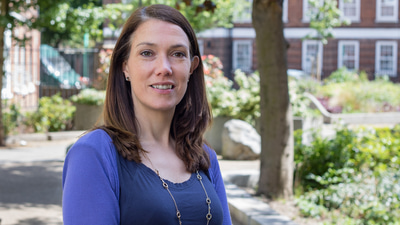- OT
- Professional support
- AOP
- “It is an honour to step up and serve as chairman of the association”
Perspectives
“It is an honour to step up and serve as chairman of the association”
AOP chairman, Dr Julie-Anne Little, on the rapid innovation in telemedicine and tech, the impact of COVID-19 on the profession, and how independent prescribing is making its mark

13 August 2021
For me, the AOP has always been the voice of the individual optometrist. We are a broad church, and it is important that we reflect the needs of members who work in many modes of practice.
I have been a member of AOP Council for a number of years and I have seen first-hand how hard the AOP works to listen to its members and engage with the key issues. The legal defence and the clinical negligence cover we offer is something that, as a member, you hope you will never need – but for those that do, there is unparalleled support on offer from the AOP.

Day to day I work at Ulster University, delivering education to the next generation of optometrists. I also work in the University eye clinic and conduct clinically relevant optometric research. This mix of roles is important to me. I am proud to be an optometrist and keep up my clinical skills. It gives me a wider view of the sector – particularly on how the education of the next generation needs to be shaped and making the most of the opportunities to create a skilled and confident workforce. One of our tasks at the AOP is to work with others to ensure there is a strong professional career for graduates to step into.
COVID-19 has been very tough on the current generation of optometry students and pre-regs. As a profession, I think we must do more to shape and mentor our future generation, including early career professionals
COVID-19 has been very tough on the current generation of optometry students and pre-regs. As a profession, I think we must do more to shape and mentor our future generation, including early career professionals. The pandemic has highlighted this to an extreme. Pre-reg optometrists in particular have been left in limbo as their Objective Structured Clinical Examinations (OSCEs) were delayed. Supervisors and the College of Optometrists have been doing their best to support pre-regs, but as the scheme is based on an annual cycle, the pandemic is continuing to have a direct impact on the current year as well as for those coming behind.
COVID-19 has produced unprecedented challenges for our everyday practice, and those challenges are different for different members. Think of the owner of an independent who is concerned about the financial viability of the practice, while trying to create a safe and comfortable environment for staff and patients. Or the employee categorised as clinically vulnerable who is working in close proximity to their patients – which let’s not forget is unusual in healthcare – and is concerned about whether the personal protective equipment on offer is sufficient.
I am really proud to be part of a profession that has shown true backbone, continuing to diligently support healthcare in the community and in the hospital setting despite the challenges. Put simply, our profession does not get the glory, but it does a tremendous job to provide eye care to the nation
A current important conversation is taking place about how we practise now that restrictions have been lifted and the requirement on wearing masks has changed. The AOP, in partnership with sector colleagues, has just produced guidance which will be important to our members and provide reassurance. There are many optometrists who will embrace the use of masks in the long-term – particularly when thinking about the close proximity elements of a sight test. The AOP will continue to produce resources to support members and help practices navigate the ‘new normal.’
I am really proud to be part of a profession that has shown true backbone, continuing to diligently support healthcare in the community and in the hospital setting despite the challenges. Put simply, our profession does not get the glory, but it does a tremendous job to provide eye care to the nation.
And patients have been appreciative of optometry as a point of contact – particularly at a time when they have not been able to engage with secondary care. The NHS has been reminded that optometry is a core health care service, and we need to keep building on that momentum, including through projects such as the outpatient transformation programme.
The devolved nations are further down the road in terms of how they have utilised optometry in eye care, and this points to definite opportunities as we move out of the pandemic.
Over the last year, I have become more aware than ever of the importance of maintaining good mental health. I am really proud of the continued value of the AOP Peer Support Line for members. I am also excited about the development of the AOP’s new mentoring programme, and I encourage members to get involved as a mentor or mentee.
I think we are at a really interesting time for independent prescribing (IP) as the number of people coming forward to take the qualification continues to grow. This movement provides an important lever for the profession to discuss how optometrists can support eye care services in primary and secondary settings.
We are at a tipping point. We are moving from a place where the early adopters were pioneering a new way of working but found there was not the structure in place in the NHS for them to utilise those skills, to a place where we can say nearly 10% of the profession has the qualification and therefore is in a better position to have a meaningful impact on eye care provision.
The AOP needs to continue to lobby and challenge the way the IP post graduate course is packaged to make sure it is accessible to anyone who wants to get involved
In educational terms, COVID-19 has made a lot of people consider the benefits of pursuing a professional certificate or some kind of additional learning. It can be a route to increased confidence in clinical decision-making and changes the way we think about clinical management.
The AOP needs to continue to lobby and challenge the way the IP postgraduate course is packaged to make sure it is accessible to anyone who wants to get involved. If we were developing the IP course now, I would argue there would not be a distinct step between the theoretical component and the practical part. The interface between the two is often a bottleneck, and this has been shown during the pandemic as optometrists have not been able to access hospital eye departments for clinical placements. The AOP has been advocating for the move to enable trained and qualified optometrists with independent prescribing rights to supervise clinical placements, rather than limiting this to the role of the ophthalmologist.
Advertisement


Comments (0)
You must be logged in to join the discussion. Log in